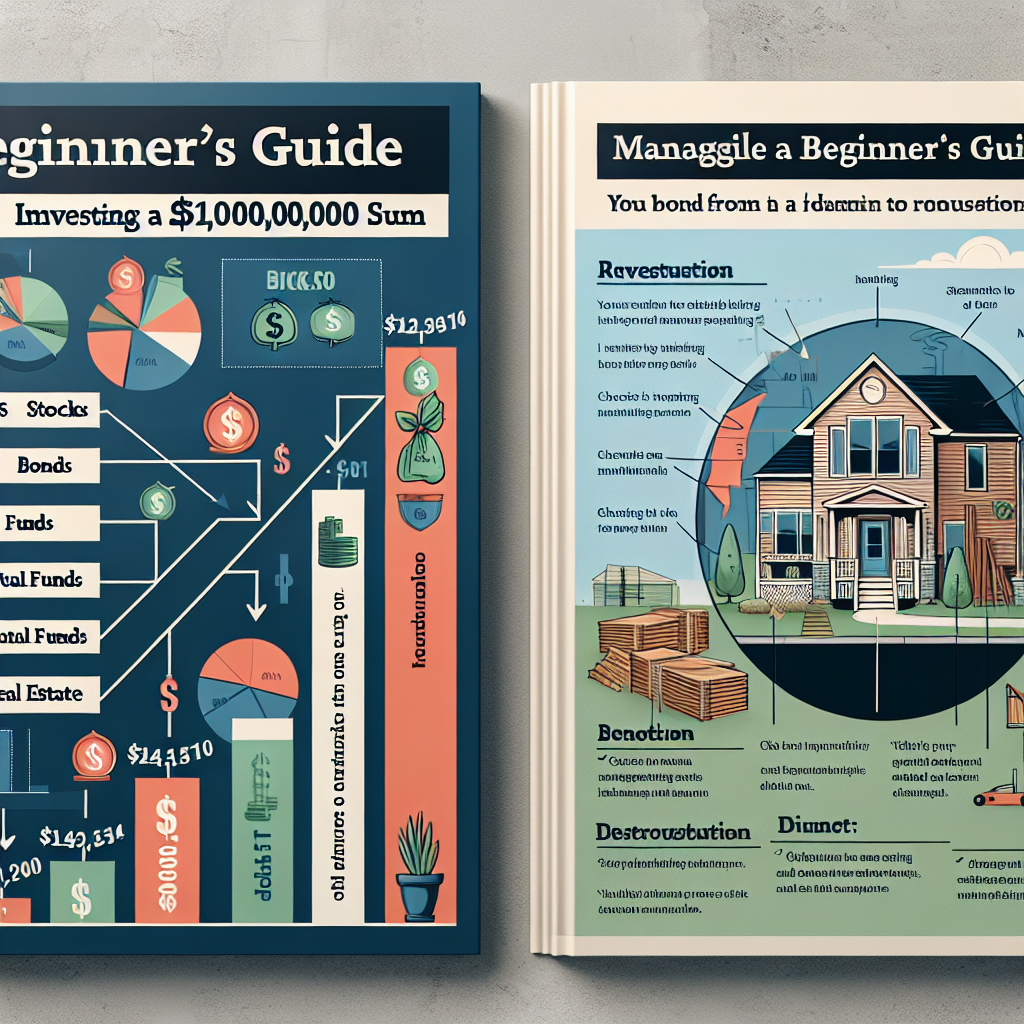-
Table of Contents
- Beginner’s Guide: Investing $100K & Managing Home Renovations
- Understanding Your Financial Goals
- Investing $100K: Strategies and Options
- Diversification: The Key to Risk Management
- Case Study: Diversified Investment Portfolio
- Managing Home Renovations: Planning and Execution
- Setting a Budget
- Choosing the Right Contractor
- Case Study: Successful Home Renovation
- Combining Investments and Renovations
- Case Study: Combining Investments and Renovations
- Monitoring and Adjusting Your Investments
- Conclusion
Beginner’s Guide: Investing $100K & Managing Home Renovations

Investing a significant sum of money, such as $100,000, can be a daunting task, especially for beginners. Coupled with the challenge of managing home renovations, it can seem overwhelming. However, with the right strategies and knowledge, you can make informed decisions that will maximize your returns and ensure a smooth renovation process. This guide will provide you with valuable insights on how to invest $100K wisely and manage home renovations effectively.
Understanding Your Financial Goals
Before diving into investments or home renovations, it is crucial to understand your financial goals. Ask yourself the following questions:
- What are my short-term and long-term financial objectives?
- How much risk am I willing to take?
- What is my investment time horizon?
- Do I have an emergency fund in place?
Having clear answers to these questions will help you create a tailored investment strategy and renovation plan that aligns with your financial goals.
Investing $100K: Strategies and Options
Diversification: The Key to Risk Management
Diversification is a fundamental principle of investing that involves spreading your investments across various asset classes to reduce risk. Here are some options to consider:
- Stocks: Investing in individual stocks or exchange-traded funds (ETFs) can offer high returns but comes with higher risk. Consider a mix of large-cap, mid-cap, and small-cap stocks to diversify your portfolio.
- Bonds: Bonds are generally considered safer than stocks and provide steady income. Government bonds, municipal bonds, and corporate bonds are popular choices.
- Real Estate: Real estate investments can provide rental income and potential appreciation. Consider investing in rental properties or real estate investment trusts (REITs).
- Mutual Funds: Mutual funds pool money from multiple investors to invest in a diversified portfolio of stocks, bonds, or other assets. They are managed by professional fund managers.
- Index Funds: Index funds track a specific market index, such as the S&P 500, and offer low fees and broad market exposure.
Case Study: Diversified Investment Portfolio
Let’s consider a hypothetical case study of John, a 35-year-old investor with $100K to invest. John decides to diversify his portfolio as follows:
- Stocks: $40,000 in a mix of large-cap, mid-cap, and small-cap stocks.
- Bonds: $20,000 in a combination of government and corporate bonds.
- Real Estate: $20,000 in a REIT that focuses on commercial properties.
- Mutual Funds: $10,000 in a diversified mutual fund.
- Index Funds: $10,000 in an S&P 500 index fund.
This diversified approach helps John manage risk while aiming for steady returns.
Managing Home Renovations: Planning and Execution
Setting a Budget
One of the first steps in managing home renovations is setting a realistic budget. Consider the following factors:
- Scope of Work: Determine the extent of the renovations, whether it’s a minor update or a major overhaul.
- Cost Estimates: Obtain detailed cost estimates from contractors for labor, materials, and permits.
- Contingency Fund: Set aside 10-20% of your budget for unexpected expenses.
Having a clear budget will help you avoid overspending and ensure that you can complete the project within your financial means.
Choosing the Right Contractor
Selecting a reliable contractor is crucial for the success of your renovation project. Here are some tips for choosing the right contractor:
- Research: Look for contractors with positive reviews and a good reputation in your area.
- References: Ask for references from previous clients and check their work quality.
- Licensing and Insurance: Ensure that the contractor is licensed and insured to protect yourself from liability.
- Detailed Contract: Have a detailed contract that outlines the scope of work, timeline, payment schedule, and warranty.
Case Study: Successful Home Renovation
Consider the case of Sarah, who decided to renovate her kitchen and bathroom. She followed these steps:
- Budget: Sarah set a budget of $30,000 for the renovations.
- Contractor Selection: She researched and interviewed multiple contractors, checked references, and chose a licensed and insured contractor with positive reviews.
- Planning: Sarah worked with the contractor to create a detailed plan and timeline for the renovations.
- Execution: The contractor completed the renovations on time and within budget, resulting in a modern and functional kitchen and bathroom.
By following these steps, Sarah was able to achieve her renovation goals without any major issues.
Combining Investments and Renovations
For some homeowners, it may be possible to combine investments and renovations to maximize returns. Here are a few strategies:
- Home Equity Loan: If you have significant equity in your home, consider taking out a home equity loan to fund renovations. This allows you to invest your $100K while using the loan for home improvements.
- Refinancing: Refinancing your mortgage at a lower interest rate can free up funds for renovations while allowing you to invest your savings.
- Rental Property: If you own a rental property, consider using rental income to fund renovations while investing your $100K in other assets.
Case Study: Combining Investments and Renovations
Let’s look at the case of Mark and Lisa, who have $100K to invest and want to renovate their home. They decide to take out a home equity loan of $50,000 for the renovations and invest the remaining $50,000 in a diversified portfolio. Their strategy includes:
- Home Equity Loan: $50,000 for kitchen and bathroom renovations.
- Investments: $50,000 in a mix of stocks, bonds, and real estate.
This approach allows Mark and Lisa to improve their home’s value while also growing their investment portfolio.
Monitoring and Adjusting Your Investments
Investing is not a one-time activity; it requires ongoing monitoring and adjustments. Here are some tips for managing your investments:
- Regular Reviews: Review your investment portfolio regularly to ensure it aligns with your financial goals.
- Rebalancing: Rebalance your portfolio periodically to maintain your desired asset allocation.
- Stay Informed: Keep up with market trends and economic news to make informed decisions.
- Consult a Financial Advisor: Consider working with a financial advisor for personalized advice and guidance.
Conclusion
Investing $100K and managing home renovations can be challenging, but with careful planning and informed decisions, you can achieve your financial and renovation goals. Start by understanding your financial objectives, diversifying your investments, setting a realistic renovation budget, and choosing the right contractor. Consider combining investments and renovations to maximize returns and monitor your investments regularly to stay on track. By following these strategies, you can make the most of your $100K and create a comfortable and valuable living space.
Remember, the key to success is thorough research, careful planning, and ongoing management. With these principles in mind, you can confidently navigate the world of investing and home renovations.








